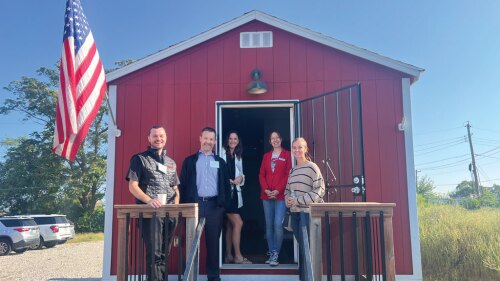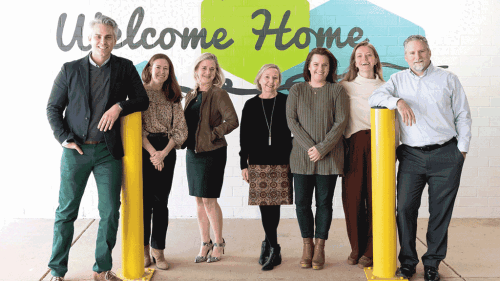A ULI Young Leaders Group donates time and talent toward creating the best possible home for service animals.
| Sunshine, a golden retriever in training to be a guide dog. |
For one day last November, members of the ULI Orange County/Inland Empire’s Young Leaders Group (YLG) found themselves in the doghouse. They had volunteered for it. Combining their love of animals, their expertise in land use, and a desire to give back to their community, the members provided advice on growth strategies through a pro bono technical assistance panel (TAP) to Guide Dogs of the Desert (GDD), a Riverside County, California–based nonprofit that pairs service dogs with people who are blind, many of whom have additional disabilities.
GDD breeds, raises, and trains guide dogs—Labrador and golden retrievers, standard poodles, and some German shepherds—and matches them with individuals who come to the GDD campus and live in dormitories while learning how to work with the dogs. The organization currently has the capacity to house up to 24 dogs on its six-acre (2.4 ha) main campus, with a satellite center providing whelping space. However, the wait list for dog placements exceeds 100 clients. GDD sought the YLG’s assistance in planning an expansion that would allow it to house and train at least 41 dogs on the main site, better equip the facility, and build a new whelping center.
GDD needed help with land use, site planning, pedestrian movement, and parking changes associated with an expansion. The panel’s top priority was provision of optimal living conditions that help prepare the dogs mentally and physically to calmly perform highly stressful service work.
“There were special requirements to consider [in terms of building placement] such as the direction of the wind, which affects the dogs’ sense of smell,” explains TAP cochair Olga Tsiba, project manager at Jeanette C. Justus Associates in San Pedro, California. When a dog’s sense of smell is inhibited, it can lead to disorientation and agitation, she says. “Other factors were the use of durable and affordable materials that could be cleaned frequently to avoid spread of illness should there be an outbreak of disease in the facility,” she says.
The panelists presented their recommendations to GDD in November, factoring in such issues as geographical constraints, possible acquisition of neighboring parcels, environmental and hazardous waste obstacles, environmentally conscious and energy-efficient building design, community support, and financing costs. The panel concluded that the existing site could accommodate the additional kennel space and recommended that GDD seek the zoning change necessary to house more dogs. However, while addressing the immediate need for more space, the panelists advised GDD to think long term and develop a master plan to include phasing of the new whelping center and installation of green features such as solar panels to offset the organization’s energy costs.
“There was not a bad recommendation in the bunch,” says Kim Laidlaw, GDD deputy executive director. GDD is looking at implementing many of the sustainable-building recommendations. The level of detail provided by the panelists—such as positioning the new kennels to account for wind direction—would have cost GDD “quite a bit of money” if it had had to pay for the advice, she notes.
In addition to Tsiba and TAP cochair Bryant Brislin, land broker at The Hoffman Company in Irvine, the panelists were Mike Hutaff, an architect with RRM Design Group, based in San Luis Obispo; Adam Lunzer, design engineer, and Paul Martin, senior associate, both with RBF Consulting in Irvine; Sean Matsler, associate, Manatt, Phelps and Phillips LLC in Costa Mesa; and Kevin Merrett, president, Quest Preservation in Fullerton.
The TAP for GDD was supported by a grant awarded to ULI Orange County/Inland Empire through ULI’s urban innovation grant program, which is funded by the ULI Foundation in recognition of ULI’s 75th anniversary.





